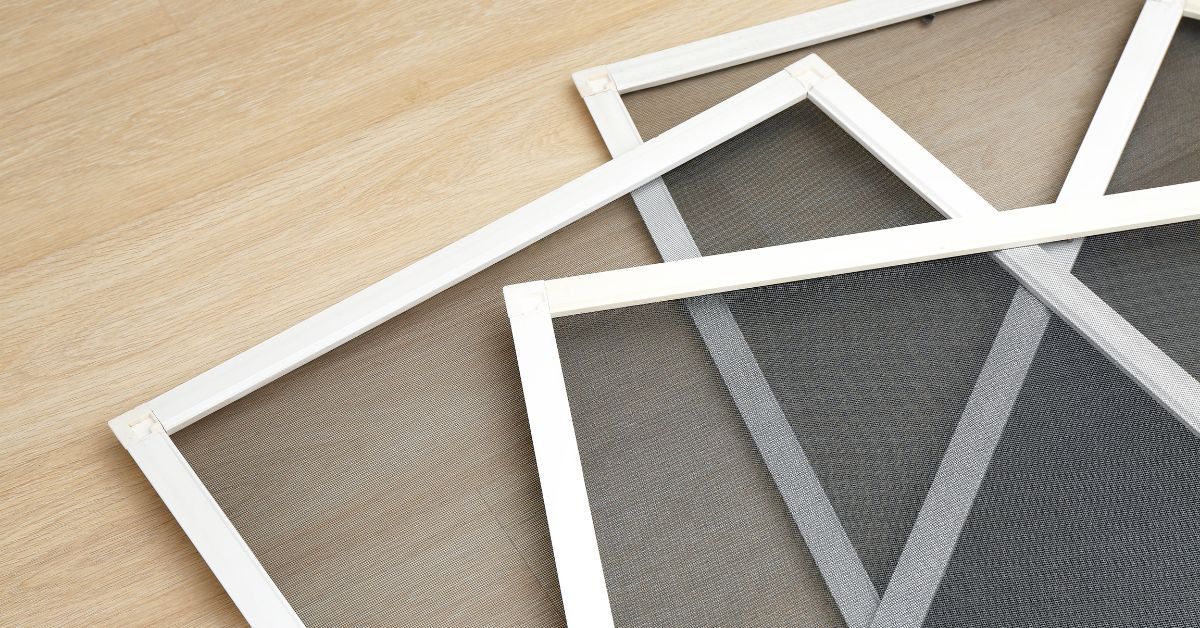Table of Contents
It may sound simple enough, but this guide offers step-by-step instructions for how to clean window screens. Maintaining the cleanliness of your window screens is essential for ensuring they continue to function effectively and improve the overall appearance of your home. Over time, screens can accumulate dust, pollen, and other debris, obscuring your view and affecting indoor air quality.
Keep reading to learn how to properly clean your window screens properly, ensuring they remain in prime condition and contribute positively to your home environment.
Why Clean Window Screens
Clean screens allow for clearer views and better airflow, and they are less likely to suffer from wear and tear from accumulated dirt and grime. Regular cleaning also helps prevent the buildup of allergens like pollen and mold spores, which can affect indoor air quality and health.
How Often Should You Clean Your Window Screens?
It’s recommended to clean your window screens at least once a year. This routine keeps them looking great and provides an opportunity to inspect the screens for any damage or wear. Regular checks can help you identify when to consider replacing screens to maintain the integrity and appearance of your home’s exteriors.
How To Clean Window Screens
Cleaning your window screens is a straightforward process that can be tackled with basic tools and supplies. Here’s how to do it effectively:
Tools Required:
- Soft bristle brush (hard bristle brushes can damage screens)
- Garden hose with spray nozzle
- All-purpose dish soap
- Bucket of lukewarm water
- Sponge
Step 1 – Remove The Window Screen
Carefully remove the window screen from the frame. If you plan on cleaning multiple screens at once, it’s a good idea to label or note which screen belongs to which window to avoid confusion when reinstalling.
Step 2 – Make Cleaning Solution In Your Bucket
Fill your bucket with warm water and add a few squirts of dish soap to create a mild cleaning solution. If you prefer using a more natural cleaner, you can substitute dish soap with white vinegar—mixing about a 50/50 ratio of vinegar to water. This homemade solution is effective, environmentally friendly, and gentle on the screens.
Step 3 – Spray Window Screen With A Hose
Position the window screen against a house wall or fence for easy cleaning. Use a garden hose with a spray nozzle to gently rinse off any loose dirt and debris. Set the nozzle to a soft to medium spray, as window screens can be delicate. A pre-rinse with a vacuum cleaner using a hose attachment might be necessary for very dirty screens.
Step 4 – Gently Scrub Window Screens With Soft Bristle Brush
Dip a soft bristle brush or sponge into the cleaning solution and gently scrub the screen to remove any stuck-on dirt or grime. Refresh the cleaning solution in the bucket if it becomes too dirty.
Step 5 – Rinse Window Screen With a Hose
After scrubbing, rinse the screen again with the hose to remove any soap and loosened dirt. Ensure you rinse thoroughly to avoid leaving any residue behind.
Step 6 – Let Your Window Screen Dry
Shake off excess water from the screen to help clear water from the mesh holes. If the weather permits, allow the screen to dry outside in the sun, flipping it midway to ensure even drying. Ensure the screen is completely dry before reinstalling to prevent moisture-related issues like mold or rust.
Step 7 – Reinstall The Window Screen
Before reinstalling the window screen, quickly wipe down the window tracks to remove any dirt or debris. Ensure the screen fits securely in the frame without gaps, which can let in insects and dust. Proper installation will ensure that the screen continues to provide effective protection and ventilation.
Custom Window Screen Replacement In Atlanta
If you find any damage while cleaning your screens, contact AAA Screen & Window to install replacement screens. We have been a leading provider of custom window screens in Atlanta since 1959 and can help upgrade your home’s screens. For professional advice and installation, contact us today to schedule a consultation and give your home the attention it deserves.
FAQ About How To Clean Window Screens
The best way to clean window screens involves removing them, gently washing with a soft bristle brush using a mix of lukewarm water and mild dish soap, rinsing thoroughly, and allowing them to dry completely before reinstalling. This method ensures that all the dirt and grime are effectively removed without damaging the screens.
Professionals typically clean screens by first vacuuming them to remove loose dust and debris. They then wash the screens with a gentle cleaning solution, often using specialized tools like a soft bristle brush or a pressure washer set to a gentle spray. Finally, they rinse the screens thoroughly and allow them to dry before reinstalling them.
Yes, you can use white vinegar on window screens. White vinegar is a great natural cleaner that effectively removes grime without leaving residues. Mix it in equal parts with water for an effective cleaning solution that is especially good at tackling tough dirt and mineral deposits.
Yes, you can clean window screens without taking them off by using a lint roller to remove dust and a damp cloth or sponge to gently wipe down the screens. For more thorough cleaning, you can use a vacuum with a soft brush attachment to safely remove more dirt while the screens are still in place.
To clean window screens with a Magic Eraser, lightly dampen the eraser and gently scrub the screens. Magic Erasers can effectively remove tough grime and stains, but they should be used gently to avoid damaging the screen mesh.
It is generally not recommended to use Windex or any ammonia-based cleaners on window screens as they can degrade the mesh material over time. Instead, stick to milder cleaning solutions like dish soap and water or vinegar and water to safely clean your screens without causing damage

